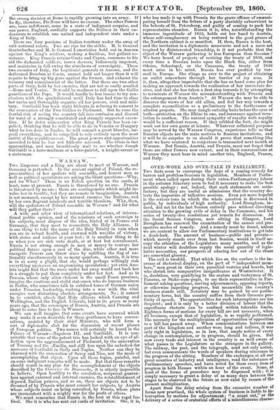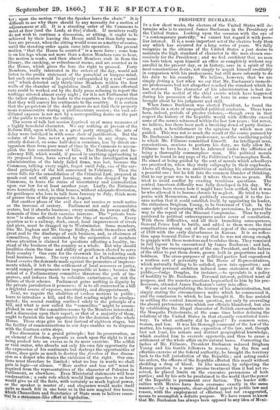OVER-WORK AND OVER-TALK IN PARLIAMENT. Two facts seem to encourage
the hope of a coming remedy for barren and profitless Sessions in legislation. Members of Parlia- ment when called upon during their extra-Parliamentary labour in the autumn itinerary seem to feel it necessary to make the best possible apology ; not, indeed, that such statements are satis- factory, but they are useful as admissions that the country de- tects the imposture of talkative sessions. Even yet more hopeful is the serious tone in which the whole question is discussed in public, by individuals of high authority. Lord Brougham, in- deed, did not let the last Session entirely pass without directing attention to the growing evils of delay in the Commons, and his series of twenty-five resolutions yet remain for discussion. At the Social Science Congress, now sitting in Glasgow, Lord Brougham has renewed the examination of the causes and pro- spective modes of remedy. And a remedy must be found, unless we are content to allow our Parliamentary institutions to get into a dead-lock. The amount of business—public and private— which merely stands over from last Session, would in itself oc- cupy the attention of the Legislature many months, and as the next winter will doubtless supply the usual quantity of legis- lative necessities, our prospects of educing law out of the chaos are somewhat gloomy.
The evil is twofold. That which lies on the surface is the in- crease of rhetorical display, on the part of " independent mem- bers," men great in their own parochial vestries and boards, but who shrink into comparative insignificance at Westminster. It is, doubtless, very gratifying to the orators and vestrymen of St. Pancras, or Stoke-cum-pogis, to see their representative in Par- liament asking questions, moving adjournments, opposing reports, or otherwise impeding progress, but meanwhile the country's business stands still. Notoriety may be gained by our parlia- mentary bores, but the country suffers from their tiresome pro- lixity of speech. The opportunities for such interruptions are too frequent; and it is only by a better division of labour that the superfluous rhetoric can be confined within tolerable limits. Eighteen forms of motions for every bill are not necessary, when all business, except that of legislation, is so rapidly performed. The necessity for the multiplication of opportunities of opposition to a bill has passed away. When communications between one part of the kingdom and another were long and tedious, it was only right in legislation, as in law, that ample notice of every change in contemplation, or in progress, should be given. But now every trade and interest in the country is as well aware of what passes in the Legislature as the strangers in the gallery. The railway, the post, and the telegraph, send not only notice, but even communicate the words of speakers during utterance in the progress of the sitting. Members of the exchanges at all our great counties of industry and intelligence, read the substance of Parliamentary speeches, and have noted for them every item of progress in both Houses within an hour of the event. Some, at least of the forms of procedure may be dispensed with ; it is simply necessary to grant a delay of as many days between the stages to be observed in the future as now exist by reason of the present multiplication.
Apart from the delajr arising from the excessive number of forms now practised, the whole syetem of business is liable to in- terruption by motions for adjournment ; "a count out," or the delivery of a series of oratorical efforts of a iniaCellaneous chaise- ter ; upon the motion " that the Speaker leave the chair." It is difficult to see why there should be any necessity for a motion of adjournment at all. It is a standing order of the Commons to meet at four (and the Lords at five) o'clock. If members really do not wish to continue a discussion, or sitting, it ought to be achieved by their leaving the House until less than forty mem- bers are present, when the sitting would cease as smatter of course, until the standing order again came into operation. The present motion " that the House be counted" is a mere farce ; some bore is on his legs whom not more than a dozen Members care to hear, the motion is made, and then absent Members rush in from the library, the smoking, or refreshment rooms, and are counted as in the House, which gives the bore the right to proceed. Forty Members, really interested in the orders of the day, would not listen to the prolix statement of the parochial or burgess mind, but such orators would be quietly extinguished by a real " count out" which detected only thirty-nine Members within the four walls of the chamber of legislation itself. A still more effectual cure could be worked out by the daily press refusing to report the verbiage uttered almost every night ; for it is not Parliament that the talker addresses; he looks to the reporters, in the expectation that they will convey his sentiments to the country. It is certain that the proprietors of the daily papers do not find their property more, remunerative during a parliamentary session ; the vast ad- ditional expense is not met by a corresponding desire on the part of the public to return the outlay.
The ocean of talk last session deprived us of many measures of a highly beneficial character. We say nothing at present of the Reform Bill, upon which, as a great party struggle, the arts of delay were indulged in with some show of justification. But the reform of the law, never a party measure in any shape, was utterly defeated, on some half-dozen occasions, less by direct an- tagonism than from pure want of time in the Commons to accom- plish the fair consideration of bills. The Bankruptcy and In- solvency Bill, which would, if passed in anything approaching to its proposed form, have served us well in the investigation and administration of the lately failed firms, was lost, because the Commons, talking every night, forgot until July, one of the car- dinal principles of the bill announced in February. Then the seven bills for the consolidation of the Criminal Law, prepared at much cost and with great learning, were also dropped by the Commons, to leave the stains of uncertainty and contradiction upon our law for at least another year. Lastly, the Estimates were hurriedly voted, in thin houses, without adequate discussion, for gentlemen who love to talk from January to July, think more of grouse than of the paymaster in August.
But another phase of the evil does not receive so much notice as the increase of oratory. Parliament not only accumulates orators, but it absorbs business; every session, its powers and the demands of time for their exercise increase. The "private busi- ness " is alone sufficient to claim the time of members. Every question as to a railway, dock, canal, local improvement of rivers and piers, must be dragged up to Westminster. Some members, like Mr. Ingham and Mr. George Ridley, devote themselves with Great zeal to the discharge of such business, and, as chairmen of committees, they are sustained by the cooperation of members whose attention is claimed for questions affecting a locality, in- stead of the business of the country as a whole. But why should localities claim the time and ability of gentlemen elected to serve their country ? One cure for the overwork lies in referring such local business home. The very existence of a Parliamentary tri- bunal creates the demands made against the promoters of improve- ments which, if left to the settlement of local assessors or juries, would compel arrangements now impossible at home ; because the ordeal of a Parliamentary committee threatens the path of im- provers, and induces them to subsidize extortioners, or risk the failure of their scheme. Parliament gains nothing in dignity by the private jurisdiction it possesses ; it is to all concerned in a bill a frightful source of expense, uncertainty, and disappointment. Next, we require the abolition of tseless motions in public ; leave to introduce a bill, and the first reading might be amalga- mated; the second reading confined solely to the principle of a bill, and what is now called the " committee" might be accom- plished in one of the committee-rooms by the Members interested ; and a discussion upon their report, or that of a majority of them, ought to furnish the last opportunity for the decision of the whole House. These steps give us four instead of eighteen stages, but the facility of communications in our days enables us to dispense with the fourteen extra steps. Free discussion is a grand principle ; but its preservation, as an element of freedom, depends as much upon the right to it not being pushed into an excess as in its mere exercise. The selfish or vain orator, who absorbs not only his own fair opportunity for the expression of his sentiments but destroys the opportunities of others, does quite as much to destroy the freedom of free discus- sion as a despot who denies the existence of the right. Our ora- tions must therefore be limited ; what we lose in words we shall gain in logic—or silence. "More matter and less art" must be required from the representatives of the character of Polonius in Parliament, as elsewhere. Even Alinisterial statements will bear condensation ; a rude rule Which would limit speeches to an hour would give us all the facts, with certainly as much logical power, as the speaker is master of.; and eloquence would make itself
quite as much felt in one hour as in the now magical five hours, -which,Chancellors and Secretaries of State seem to believe essen- Val to witatesman-like effort at legislation.



























 Previous page
Previous page